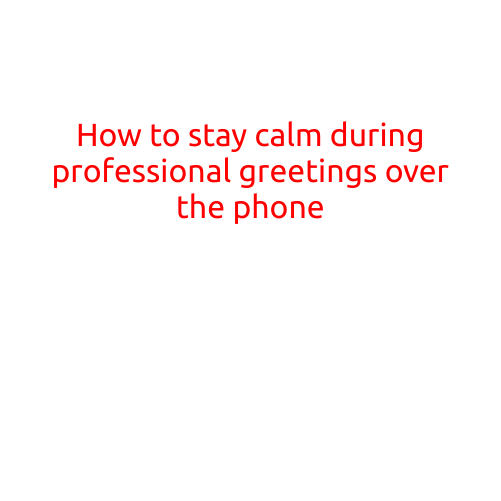
What is the Best Way to Dealing with Angry Callers?
As a customer service representative, you may encounter angry callers who are frustrated with their experience with your company. Dealing with angry customers can be challenging, but it’s essential to handle them professionally and efficiently to resolve their issues and maintain a positive reputation for your business.
In this article, we’ll provide you with some tips and strategies on how to deal with angry callers and turn their experience into a positive one.
Step 1: Stay Calm and Composed
When an angry caller gets in touch with you, it’s essential to remain calm and composed. Take a deep breath, count to ten, or step away for a moment to collect your thoughts before responding to their concerns. A calm and composed demeanor can help to de-escalate the situation and avoid making things worse.
Step 2: Acknowledge Their Feelings
Angry callers often feel unheard or ignored, which can amplify their frustration. Acknowledge their feelings by saying something like, “I understand why you’re upset” or “I apologize for the inconvenience you’re experiencing.” This shows that you’re listening to their concerns and empathize with their situation.
Step 3: Listen Actively
Listen actively to what the caller is saying, and ask clarifying questions to ensure you understand their issues. Repeat back what you’ve understood from the conversation to show that you’re paying attention and take notes if necessary. This helps to prevent misunderstandings and shows that you’re committed to resolving their problem.
Step 4: Focus on Solutions
Instead of getting defensive or arguing with the caller, focus on finding a solution to their problem. Ask open-ended questions like, “What can I do to resolve this issue?” or “How can I make things right?” This helps to shift the focus from the customer’s anger to finding a resolution.
Step 5: Offer Options and Escalation
If you’re unable to resolve the issue immediately, offer options for the customer to escalate their concern to a supervisor or another team member who may be able to assist. Remember to follow up with the customer to ensure their issue has been resolved and to gather feedback.
Step 6: Follow Up
After the call, follow up with the customer to ensure their issue has been resolved and gather feedback on the experience. This helps to build trust and shows that you’re committed to continuous improvement.
Additional Tips
- Be patient and don’t rush the conversation. Remember that the customer is upset, and they may need more time to express their concerns.
- Avoid taking it personally. Remember that the customer’s anger is often directed at the company, not you as an individual.
- Use a professional and respectful tone, even if the caller is being abusive or aggressive.
- Document every interaction with the customer, including the resolution and any agreements made.
- Review and learn from the experience to improve your communication skills and customer service strategies.
Conclusion
Dealing with angry callers requires empathy, professionalism, and effective communication skills. By following these steps and tips, you can turn an angry caller’s experience into a positive one and maintain a positive reputation for your business. Remember that customer service is about resolving issues and providing solutions, not arguing or taking sides.





